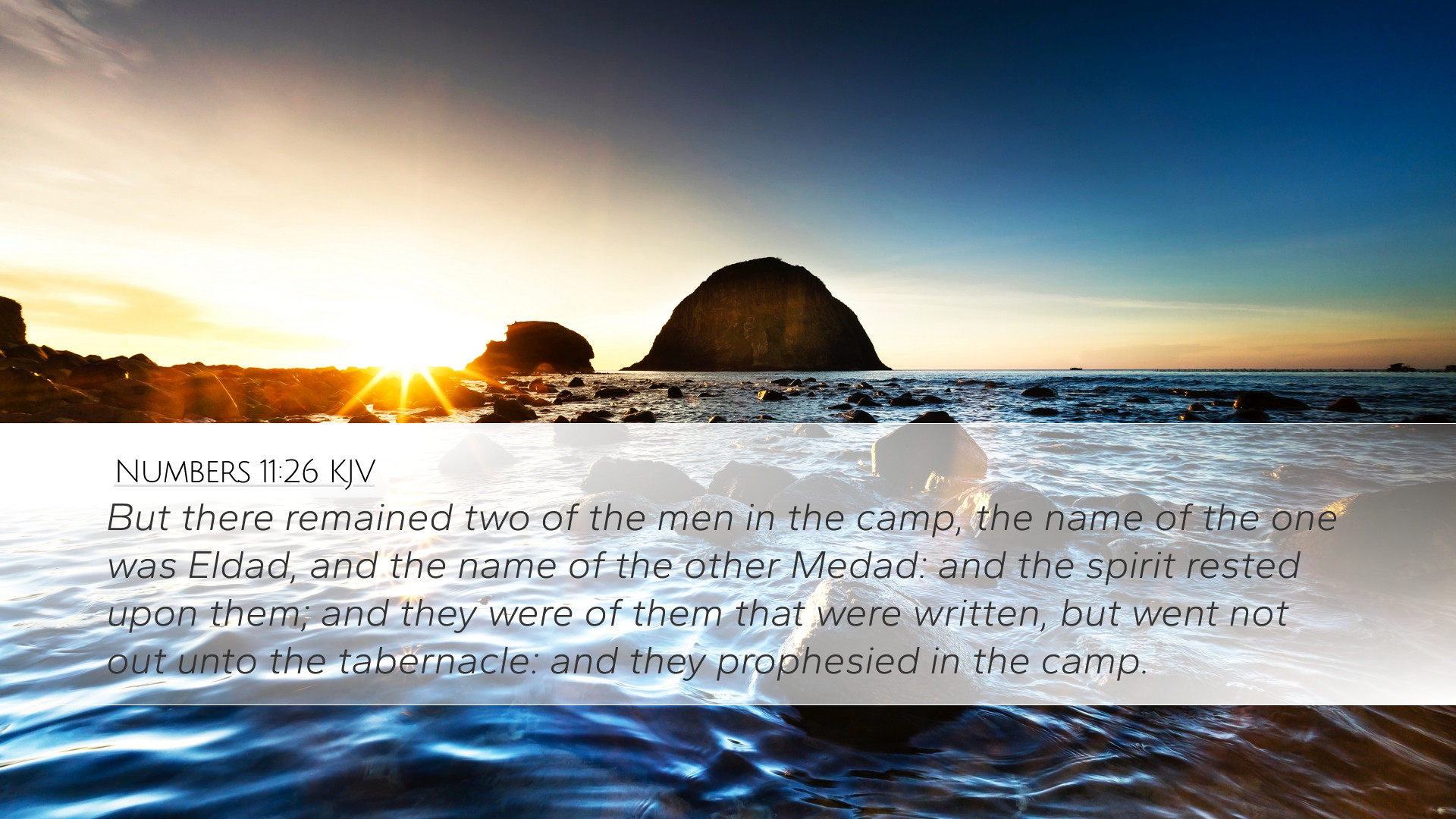Commentary on Numbers 11:26
Verse Context: Numbers 11:26 states, "But there remained two of the men in the camp; the name of the one was Eldad, and the name of the other Medad: and the spirit rested upon them; and they were of them that were written, but went not out unto the tabernacle: and they prophesied in the camp."
Introduction
This passage from the Book of Numbers reveals a poignant moment in the history of Israel, highlighting the divine selection of leaders and the empowerment of God's Spirit upon individuals. The backdrop involves Moses, who is burdened by the weight of leadership and seeks help from God to delegate authority among the people. In this context, Eldad and Medad emerge as significant figures empowered by the Holy Spirit, illustrating the theme of divine calling and the unexpected ways in which God can work through His people.
Insights from Matthew Henry
Matthew Henry emphasizes the remarkable nature of Eldad and Medad's experience, focusing on the manifestation of the Spirit outside the expected confines of the Tabernacle. Henry notes that their location within the camp points to an essential truth—that God's Spirit cannot be confined to any earthly structure or institution. He elaborates on the significance of their names, suggesting that Eldad, meaning "God has loved," and Medad, possibly meaning "beloved," reflects their intimate relationship with God and the depth of His affection towards His people.
Henry also draws attention to the fact that Eldad and Medad were not present during the formal gathering of the seventy elders; however, they were still recognized as part of that divine appointment. This serves to remind us that God's anointing is not limited by human structures and that He can raise leaders from unexpected places.
Albert Barnes' Commentary
Albert Barnes provides a thorough analysis of the historical and theological implications of this passage. He notes that the scene happens shortly after Moses had requested help due to the burdensome nature of leading Israel. Barnes reflects on the surprise and excitement that arose when Eldad and Medad began to prophesy, as it sparked jealousy and confusion amongst the other leaders, particularly Joshua, who sought to restrain them.
Barnes observes that this incident highlights a critical lesson for the body of Christ today: the idea that God's Spirit may operate through anyone, regardless of their position or recognition within the community. The prophecy of Eldad and Medad signifies an empowering truth regarding the democratization of the Spirit, implying that God’s call is not restrained by human hierarchy.
Adam Clarke's Interpretation
Adam Clarke offers a rich exposition on the transformative power of the Holy Spirit in this narrative. He notes that the spontaneous outpouring of the Spirit upon Eldad and Medad serves as a foreshadowing of the future outpourings of the Spirit experienced in the Christian church, as seen in Acts 2 during Pentecost. Clarke underlines that this prophecy in the camp demonstrates that God equates spiritual authority with spiritual experience rather than mere human appointment.
Moreover, Clarke discusses the implications of this event for the leadership model in the church, positing that it challenges conventional notions of authority and calls believers to remain open to the unexpected moving of God among His people, regardless of their status. He emphasizes the need for humility and recognition that the Spirit can speak through anyone who is genuinely responding to God's call.
Theological Implications
The narrative of Eldad and Medad raises theological questions regarding the nature of spiritual authority and the workings of the Holy Spirit within the community of faith. It prompts believers to consider how we discern God's call and how we recognize the gifts and workings of the Spirit. This passage invites reflection on the ecclesiological foundations of authority and leadership, urging the Church to embrace diversity in spiritual gifts and prophetic voices.
Practical Applications
- Openness to the Spirit: As believers, we must cultivate a posture of openness to the movements of the Holy Spirit, understanding that He can speak in unexpected ways and through unexpected people.
- Encouragement of Gifts: Churches should seek to foster an environment where spiritual gifts are recognized and encouraged, allowing for the flourishing of the prophetic voice within the body of Christ.
- Resisting Jealousy: The jealousy displayed by Joshua serves as a reminder to resist envy over God's assignments among fellow believers, focusing instead on unity and cooperation in the work of the Kingdom.
Conclusion
The story of Eldad and Medad in Numbers 11:26 is a bold reminder of God's sovereignty and the extraordinary way He empowers individuals to speak on His behalf. For pastors, theologians, and scholars, it invites a deep contemplation of God's agency and the fluidity of authority in the Church. As we exercise discernment and humility, we can ensure that the work of the Holy Spirit continues to flourish within our communities, ultimately leading to greater unity and effectiveness in our mission to proclaim His Kingdom.


